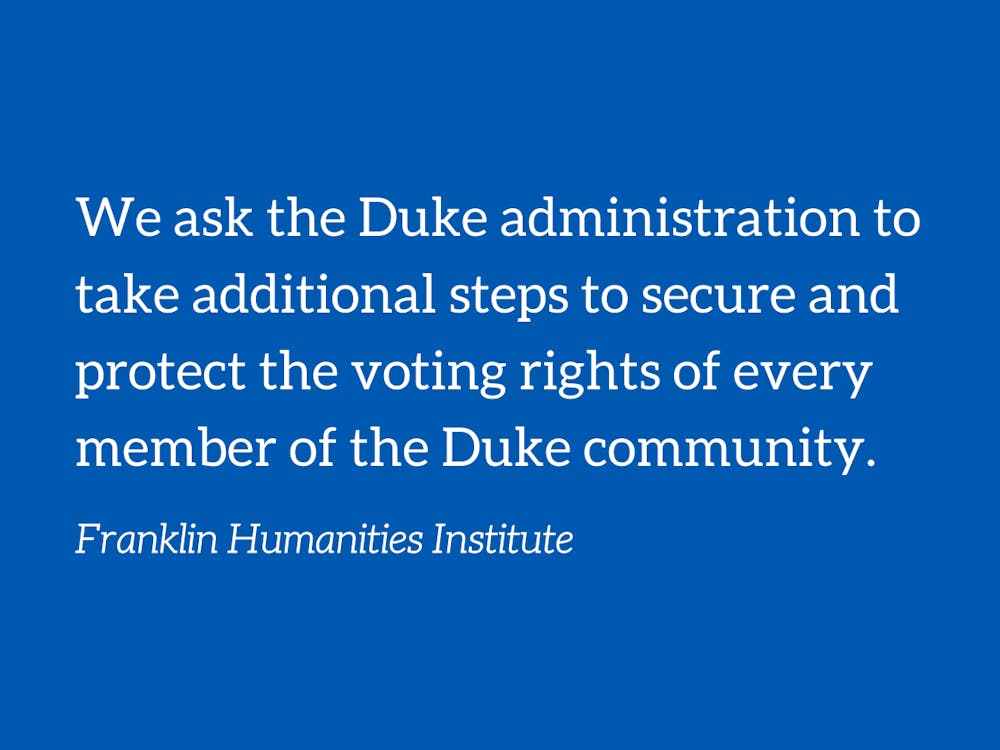Our country has never had to conduct an election under circumstances as dire for participation and fair and timely counting as that of 2020.
As members of the Faculty Advisory Board of the Duke Human Right Center at the Franklin Humanities Institute, we first want to applaud Duke administrators for supporting the voting rights of the Duke community by agreeing to host an early voting site on campus at the Karsh Alumni Center throughout the seventeen days of early voting, beginning Oct. 15. We also want to acknowledge the wisdom and foresight that Duke administrators demonstrated in giving faculty the discretion to give Trinity students a break from their classes and assignments on election day and during election week, to encourage students not only to vote but to participate in helping others do so in this important election.
Given the uncertainties of the present moment associated with the COVID-19 pandemic, however, we ask the Duke administration to take additional steps to secure and protect the voting rights of every member of the Duke community. We know that voting rights are human rights and they must be protected more proactively.
To that end, we ask Duke administrators to consider the following additional and necessary actions.
1. Make voting easily available to all staff. Staff should be allowed paid time off to vote, whether during early voting (when registration issues can still be fixed) or on Election Day;
2. Encourage students and younger members of the community to serve as poll workers on election day so that all of Durham’s precincts may remain open. We ask that members of the Duke community have sufficient time off to train and serve as poll workers and assist others in accessing the polls;
3. Provide clear and accessible guidance via university communications on how students, faculty, and staff can register and vote either on campus, in their home states, their local precincts, or by absentee ballots. Devote the necessary resources to make these communications visible and accessible to every member of the Duke community;
4. Encourage professional/graduate programs to also give faculty the option to cancel or reschedule class on Election Day so that student can vote or work at the polls;
5. Draw up a contingency plan, with input from every member of the Duke community, about how voting rights will be maintained and kept secure in the event that the university must close before the end of early voting or before the election;
6. Because voting rights are human rights not only on Duke’s campus, devote the necessary resources to help Duke’s sister institutions in Durham County maintain access to voting for their respective work and student communities. That might include support for rides to the polls for any Durham resident needing help voting on election day.
With the US trailing most other developed democratic nations in voter turnout even before the COVID-19 crisis, we must make an all-out effort to enable all voices to be heard. We urge Duke administrators to join us in protecting the voting rights of every member of the Duke community as well as our neighbors and friends in Durham County. We stand ready to join with them and all members of the Duke community in protecting our voting rights this important election.
We invite the community to join us for Voting Rights are Human Rights: A Joint Faculty-Student Zoom Teach-In on Wednesday, Aug. 26 at 5:30 p.m. Register in advance here.
Signed,
Robin Kirk, Senior Lecturer of Cultural Anthropology and Faculty Co-Director of the Duke Human Rights Center at the Franklin Humanities Institute and a founding member of the Pauli Murray Project
Nancy MacLean, William H. Chafe Professor of History and Public Policy
Gunther Peck, Associate Professor of Public Policy and History and Director of the Hart Leadership Program
Erika Weinthal, Professor of Environmental Policy and Public Policy and Faculty Co-Director of the Duke Human Rights Center at the Franklin Humanities Institute
Liliana Paredes, Professor of the Practice, Romance Studies Department Linguistics Program, Director Spanish Language Program
Priscilla Wald, R. Florence Brinkley Professor of English
Catherine Admay, Senior Lecturer of Public Policy and co-chair of the Concilium on Southern Africa at Duke (COSA)
Get The Chronicle straight to your inbox
Sign up for our weekly newsletter. Cancel at any time.
James Chappel, Hunt Family Assistant Professor of History
Edna Andrews, Professor of Linguistics & Cultural Anthropology; Nancy and Jeffrey Marcus Professor; Chair, Linguistics Program
Ellen McLarney, Associate Professor of Arabic Literature and Culture, Asian and Middle East Studies
Claudia Koonz, Peabody Family Distinguished Professor Emeritus of History
Elizabeth Albright, Assistant Professor of the Practice of Environmental Science and Policy Methods
Mona Hassan, Associate Professor of Religious Studies, History, ICS, & GSF
Adam Rosenblatt, Associate Professor of the Practice in International Comparative Studies
William H. Chafe, Alice Mary Baldwin Professor of History, emeritus
Rebecca Stein, Associate Professor of Cultural Anthropology
Barbara Lau, Director, Pauli Murray Project
Robert Korstad, Professor Emeritus, Public Policy and History
Saskia Cornes, Assistant Professor of the Practice, Franklin Humanities Institute
Program Director, Duke Campus Farm
David Schaad, Professor of the Practice and Associate Chair; Department of Civil and Environmental Engineering
Ranjana Khanna, Director, Franklin Humanities Institute; Professor of English, Literature, and Women’s Studies
Emily Stewart, Assistant Director, Duke Human Rights Center at the Franklin Humanities Institute

